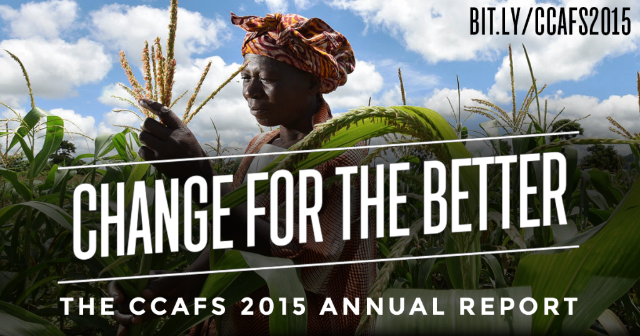
CGIAR Research Program on Climate Change, Agriculture and Food Security (CCAFS) has just released its 2015 Annual Report in an online version.
2015 was a crucial year for climate research and action. Agriculture gained prominence in the Paris climate agreement, and CCAFS science increasingly informed initiatives to enhance millions of farmers’ resilience to climate impacts and help them reduce emissions.
There was strategic support to 9 national and 23 subnational initiatives, with scientists closely partnering with policy makers to strengthen the national plans that will deliver the Paris Agreement, among others.
At the farm level, CCAFS continued to deepen engagement with farmers, through collaboration in climate-smart villages.
Some highlights:
- India has committed to protecting millions of farmers from climate change by investing in scaled-up climate-smart villages, improved index insurance and solar-powered water pumps, thanks to ongoing engagement with CIMMYT
- Climate-proofing coffee and cocoa production in Africa: The International Fund for Agricultural Development (IFAD) is increasingly adopting science from CIAT and CCAFS to climate-proof their project design and implementation
- Scenario-guided policy development is informing agriculture, climate and development policies in 7 countries
- Costa Rica, Nepal and Uganda adopt crop diversity policies as part of climate-resilience planning, with strong support from Bioversity
- Bangladesh and Vietnam work with IRRI scientists to scale up water saving technology to benefit rice farmers and reduce emissions
- Climate-smart dairy farming takes off in Kenya, as ICRAF scientists join government authorities, the private sector, producer organizations and development agencies to develop capacity and disseminate technologies
